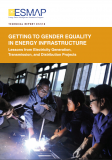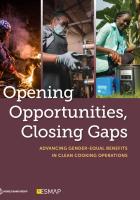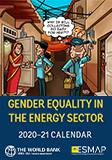Publications
At the current rate of ambition, the world will fall short of achieving sustainable development goal 7 (SDG 7) by 2030. Slow progress toward access to clean cooking solutions has significant negative impacts on women (for example, harm to health from disproportionate exposure to household air pollution (HAP); safety hazards and risks to well-being; and the opportunity costs of fuelwood collection, fuel preparation, and inefficient cooking).
To accelerate the transition to clean cooking by 2030, the World Bank’s energy sector management assistance program (ESMAP) has established the United States (U.S.) 500 million dollars clean cooking fund (CCF). The success of such initiatives and future programs can be enhanced by gaining a greater appreciation of the gender gaps in clean cooking and heating operations and knowledge about how to bridge them.
This report introduces World Bank task teams and other practitioners to the key arguments, opportunities, and practical steps for integrating gender considerations into clean cooking programs.
Part one presents the supporting arguments that recognize women as both beneficiaries and agents of change.
Part two stimulates task teams to think more broadly about the possible opportunities for advancing gender equality across the value chain, drawing on the rich experience of the World Bank’s active lending portfolio, as well as best-case practices from private-sector initiatives and the literature on clean cooking and gender. Based on lessons from these empirical findings, part three suggests practical steps for tailoring projects to the distinct needs of women and men and thus increasing the likelihood of: (i) reducing gaps in asset ownership and human endowments, and (ii) capitalizing on growth opportunities.
Acuna Castillo,Nathyeli Yethzi; Zhang,Yabei; Ochieng,Caroline Adongo; Adams,Norma; Schomer,Inka Ivette; Wu,Jingyi; Pinto,Alisha Noella; Greene,Jennye Elizabeth; Morris,Ellen; Matinga, Magi.
Opening Opportunities, Closing Gaps : Advancing Gender-Equal Benefits in Clean Cooking Operations (English). Washington, D.C. : World Bank Group. http://documents.worldbank.org/curated/en/099215003152218466/P1742320beb6090670933705085ff1c047b


